The Best Goat Milk Formula (2024 Guide)
This post may contain affiliate links. As an Amazon Associate, I earn from qualifying purchases. Please read my disclosure.This in-depth, parent-friendly guide will help you find and buy the best goat milk formula for your baby. You will learn why you should consider goat milk formula and why it can be a great alternative to cow’s milk, which ingredients to avoid in formula, and where you can reliably purchase goat formulas for your baby. I update this post monthly to ensure that all of the information below is recent and accurate!

So many of you have come across my best organic baby formula post – and I’m so glad that post has been helpful! One of the most common questions I get when it comes to baby formula is: What about goat milk formula? Is it better than cow’s milk formula? And which one is the best?
Originally, goat milk was only readily available in Europe or through European-based subscription services, but the FDA approved goat milk formulas for sale during the 2022 formula shortage to expand formula offerings. Since being approved, more research has been done on goat’s milk formulas and it has been found that it is just as nutritious and good for babies as traditional cow’s milk formula (source).
In general, goat milk formula can be a good option for babies. It is generally easier to digest and contains a different type of casein protein (more on that below!), making it a potentially good option for babies who just aren’t tolerating cow’s milk formula well. If possible, I always recommend choosing an organic baby formula, and therefore an organic goat milk formula, whenever possible to avoid GMOs, synthetic ingredients, non-organic pesticides, and hormones.
Read on to find out everything you need to know about goat milk-based infant formula, the different brands of goat milk formula available, and which one is the best option for your baby!
But First, A Quick Disclaimer
As a board certified health coach and certified nutritionist, I support products and ingredients that are rooted in science and are evidence-based. Using my background in nutrition, along with extensive research, consultations with experts, and my own personal experience giving my two kids formula, I was able to arrive at this list of the best goat milk formula for babies in this guide. This post has also been medically reviewed and fact checked by Katie Drakeford, MA, RD, CSP, LD, CLC (see my about page for more info about Katie).
Though I may receive a commission (at no extra expense to you) if you purchase through some of the affiliate links provided, I only recommend products I’ve researched, evaluated, consulted experts on, and would feel comfortable giving to my own two children.
As always, I only share products that are the highest quality and that can help you and your family the most. By purchasing any of these products from the links below, you help keep this blog running, so thanks for your support!
Keep in mind that every baby & situation is different, so when it comes to choosing a baby formula, please consult with your pediatrician first before starting or switching to a new formula. My recommendations are not a substitute for professional medical advice, diagnosis, or treatment.
What Is Goat Milk Formula?
Goat milk formula is a type of infant formula that is made from goat’s milk instead of cow’s milk. It is formulated to meet the nutritional needs of babies who are either exclusively formula-fed or who require supplemental feeding in addition to breastfeeding.
There are also goat milk toddler formulas that are ideal for toddlers ages 12-24 months. Some brands of goat milk even have an early infant formula (for babies aged 0-6 months).
Goat milk-based formula contains a blend of essential nutrients, including protein, fat, carbohydrates, vitamins, and minerals (including iron), that are necessary for a baby’s growth and development. Goat milk formula is safe for newborns – a recent study showed that goat milk formula for newborn babies worked just as well as breast milk when it came to growth and safety.
Infant goat milk formula may be recommended for babies who are allergic to cow’s milk or who have difficulty digesting it, as goat’s milk is considered to be more easily digestible than cow’s milk for some babies (source). But it’s not solely meant for babies with sensitive digestive systems, as it’s not a hypoallergenic formula and is formulated for all babies.
Note: If you are considering switching to goat milk formula (or before transitioning to any infant formula), make sure to speak with your pediatrician first!
What Are The Benefits Of Goat Milk Formula?
Goat milk infant formula can be a nutritious option for your baby. Here are a few of its most significant benefits:
- Anti-inflammatory: The goat milk that the formula is made from is very high in oligosaccharides which are also found in high quantities in breast milk. They have prebiotic and anti-inflammatory properties which promote and aid in the growth of healthy bacteria in the gut, reducing inflammation (source).
- Digestion: There are many reasons why goat’s milk is easier to digest. First of all, the milk predominantly contains A2 proteins (check out the next section to learn more) instead of A1 proteins, which have been clinically proven to have fewer digestive problems compared to A1 proteins (source). The protein in the milk, when interacting with stomach acid, also forms a softer curd (similar to that of the curds formed from breast milk) than cow’s milk curds, and are therefore easier for a baby’s tummy to process. Finally, the shorter-chain fatty acids in goat’s milk are more readily absorbed than the longer-chained fatty acids found in cow’s milk, making it a more gentle option.
- Eczema: Recent studies are finding that eczema, or atopic dermatitis might occur less frequently in infants receiving goat’s milk formula compared to cow’s milk formula (source).
For even more benefits, check out this list of the top 10 Benefits of Goat Milk Formula for babies.
How Is Goat Milk Formula Different From Cow’s Milk Formula?
Goat milk formulas and cow’s milk formulas are very similar in nutritional content. They both contain the right balance of vitamins, minerals, proteins, fats, and carbohydrates that are important for your baby’s growth and development.
There are a few differences between the two types of formulas that may make goat milk-based formula a better choice for your baby:
- Lactose: First, goat milk contains less lactose than cow milk (source), making it easier to digest, especially for babies who are sensitive to lactose.
- A2 Protein: Goat milk is made up of A2 casein protein, whereas there is A1 casein protein in cow’s milk. A2 protein is supposed to be easier to digest when compared to A1 (source).
- Fat Composition: Goat milk has smaller fat globules (medium chain fatty acids; source), compared to cow’s milk which has more long-chain fatty acids – which can be harder for your baby’s digestive system to break down.
- Nutritional Content: Whereas all of the goat milk formulas listed in this post are approved by the FDA or the European Commission for being a complete source of infant nutrition, the natural nutritional content of cow milk and goat milk does differ. Goat milk is naturally a great source of vitamin A, calcium, and essential fatty acids (source), though cow’s milk formula is fortified with these nutrients so the end versions of the two formulas don’t differ greatly in their nutritional value.
- Taste: Goat milk formula can have a stronger flavor than cow’s milk, though it is often creamier and sweeter. Because of this, all babies may not prefer it.
- Price: Cow’s milk formula tends to be more affordable than goat’s.
- Availability: Historically, cow’s milk formula was much more easy to find in the United States than goat’s milk formula. During the 2022 formula shortage, however, the FDA approved goat milk-based formula to be sold in the United States, now making it easier to find in stores. You can also purchase the formula through many popular subscription services.
- Sustainability: Goat milk is often considered a more ethical and sustainable alternative to cow milk, as goats require less land, water, and feed than cows to produce the same amount of milk. Goats are also used to clear overgrown grassy areas in some wildfire-prone areas like Northern California to reduce wildfire risk
For more details on what the pros & cons are of goat milk vs. cow milk formula, check out my guide to Goat Milk Formula vs. Cow’s Milk Formula.
Is Goat Milk Formula Better For Babies?
The answer is: it depends! Goat milk formula can be a better option for some babies (source), but not for others, and it all depends on each baby’s individual needs and circumstances such as allergies, digestive issues, and nutritional needs.
Goat milk formula is designed to provide excellent nutrition to all babies (source), and some babies will do better on goat milk formula because of the reduced lactose, easier-to-digest fats, and A2 milk proteins. For babies who do not tolerate cow milk-based formula well, goat milk formula may be a good alternative. However, some babies may not like the taste of goat milk formula, or they may get constipated on goat milk vs. cow milk formula. If your baby is doing well on cow milk formula, there may be no need to switch to goat milk formula (and vice versa).
Ultimately, there is no way to know whether goat milk formula will be better for your baby without consulting your pediatrician and possibly a little bit of trial and error.
Ideal Goat’s Milk Formula Ingredients
Here is what to look for when choosing a goat milk formula:
✅ Ideally organic, or at least non-GMO. If the milk is imported from the EU or New Zealand that’s even better because you end up with high standards for the treatment of animals and the processing of milk. Holle Formulas, Jovie, and HiPP are all organic and are all produced in the EU; Nanny Care is produced in New Zealand.
✅ Primary carbohydrate is lactose. No syrup solids, sugar, glucose syrup, maltodextrin, or other added sugars should be used.
✅ 60:40 whey-to-casein ratio. Breastmilk has a 60:40 whey-to-casein ratio, so it’s ideal for formulas to mimic this same ratio to avoid digestion issues, constipation, gas, and discomfort in babies. Goat milk naturally has a 20:80 whey-to-casein ratio, so many goat milk formulas will also end up with that same ratio. Human milk contains more whey than casein – and goat milk contains much more casein than whey – so a formula that adds goat whey protein will be easier for babies to digest. An alternative is for formula brands to add other ingredients like healthy fats and prebiotics – as Jovie does – to aid in smooth digestion despite the whey-to-casin ratio.
✅ Addition of Omega 3 & 6 fatty acids. Omega-3 fatty acids (DHA) and omega-6 fatty acids (ARA) should be added for healthy brain development and to match what’s naturally found in human breast milk.
✅ Prebiotics added. These bolster gut health as well as immune system support. Ideally, probiotics are added as well, but you can also supplement with probiotics for formulas that don’t contain it, whereas it is much harder to supplement with prebiotics for infants.
✅ No highly processed ingredients. This includes carrageenan, soy protein (soybean oil is ok), ingredients processed with hexane, glucose syrup solids, and more. A note about hexane: most often, DHA is commonly extracted with hexane but other ingredients can be extracted as well.
✅ Texture. Is the formula easy to mix and does it dissolve well? Smooth and creamy formulas tend to be more tolerable for babies, whereas chalky or lumpy ones aren’t always favorites.
✅ Gluten-free. Most formulas are naturally gluten-free, but it’s important for the manufacturing facilities the formulas are produced in to not have any cross-contamination issues as well.
A note about palm oil and soy lecithin: These two ingredients are not ideal and are more processed, but are not as “harmful” as something like glucose syrup solids or GMO ingredients added to the formula. It can sometimes be impossible to find a formula that both meets your budget and all of the criteria above. So if you find a formula that meets these standards but happens to include either palm oil or soy lecithin, but works well for your baby, I would still recommend using it. The reason I have ranked Jovie Goat Milk formula as #1 is because it’s the only formula I have found that meets all of these criteria and also does not include soy lecithin or palm oil!
Ingredients To Avoid In Formula
❌ Synthetic DHA and ARA: DHA and ARA are naturally found in breast milk. When added to a formula it is often extracted using hexane. DHA and ARA that are extracted using a different process, such as cold extraction, are preferred.
❌ GMOs: Look for formulas that are certified non-GMO. If you buy an organic formula, it is automatically non-GMO. GMOs are concerning because they are genetically engineered crops that are made to be resistant to glyphosate (RoundUp) – the residue of which can end up in food.
❌ Carrageenan: This ingredient has been banned in Europe but is still used in formulas in the US. It is known to cause inflammation in the intestines and therefore isn’t good to feed to infants (source).
❌ Soy or soy-based products: Too much soy given to infants may lead to health complications in the future (source).
❌ Palm Oil: Palm oil is in most US formulas. It is not environmentally friendly and can cause digestive issues in some babies. It can also limit calcium and fat absorption (source), but, like I mentioned above, this one is hard to avoid for the most part!
For more baby nutrition options beyond bottle feeding, check out my best organic baby food recipes!
Quick Picks: Best Goat Milk Formulas
Here is my “at a glance” view of the best goat milk baby formula based on different needs. Looking for a budget-friendly clean baby formula? A goat milk toddler formula? A European goat milk formula? The best overall? We have you covered.
We chose these formulas based on: over 100 hours of research, speaking with thousands of parents on what has worked for their children (along with personal experience with my own two kids), reviewing the ingredients of every goat formula brand on the market, speaking with doctors and pediatricians, and reviewing countless articles and peer-reviewed studies. There aren’t as many goat’s milk formula options as there are cow’s milk formula options. That said, there are a few high quality goat milk formulas, and more coming on the market now that they are more readily recommended by pediatricians.
Further down in this guide, you will find a detailed list of the top 10 best goat milk formulas, one runner-up, and why we love each of these options.
- Best Organic Goats Milk Formula Overall: Jovie Goat Milk Formula
- Best Goat Milk Infant Formula: Aussie Bubs Goat Milk Formula
- Best Toddler Goat Formula: Kabrita USA
- Best Goat Milk Formula Using Whole Milk: Kendamil Goat and Nanny Care
- Best European Goat Milk Formula: HiPP Dutch Goat
- Best Goat Formula With Prebiotics: Kabrita Infant Formula
- Best Affordable Goat Milk Infant Formula: Holle Goat Milk Formula (German)
- Best New Goat Milk Based Formula: Holle Goat (Dutch)
- Best Goat Formula With DHA: Premibio Goat
Which Goat Formula Is Best?
Of these formulas, the European version of Jovie Goat Milk Formula is by far the best goat milk baby formula, and the best organic goat milk formula, on the market today.
If I was going to give my own child a goat milk baby formula, I would choose Jovie Goat Formula.
Why Jovie Goat Milk Formula Is The Best
Jovie Goat Milk Formula is a great product and is ideal for healthy development for a few reasons:
- Whole Goat Milk: Made with whole A2 Goat Milk instead of skimmed milk like most other formulas. This 100% full cream goat’s milk is also loaded with prebiotics. Goat milk protein is also easier to digest than cow’s milk protein.
- Allergen-friendly: It is made with no palm oil or coconut oil.
- Fatty Acids: This formula contains essential fatty acids DHA & ARA. Note: it does use fish oil so it is not vegetarian. For a vegetarian goat milk formula, I recommend Kendamil Goat.
- Hexane-Free: Jovie doesn’t contain any hexane-extracted products.
- Organic & Non-GMO: Produced in the Netherlands, this formula is made with the highest organic standards.
- Natural Prebiotics: Similar to breast milk, Jovie contains natural prebiotics which are known to boost your baby’s immune system (source).
- No Added Sugars or Preservatives: No corn syrup or glucose syrup, sugars, synthetic preservatives, wheat, soy, maltodextrin, or peanut ingredients.
- Lactose is the Main Ingredient: The main carbohydrate in this formula is lactose, which is also the main carbohydrate in breast milk.
- Nutritious: Contains essential vitamins like folic acid, vitamin D3, vitamin C, vitamin B12, vitamin B6, vitamin A, and vitamin E.
Important Note: If your child has had an allergic reaction to cow’s milk or cow milk formula, or is completely lactose intolerant, then you likely need a true hypoallergenic formula as goat milk may not work for your child.
The 10 Best Goat Milk Formulas (Details)
The list below describes the 10 best goat milk formulas on the market today and the pros and cons of each! Just click on the product name to my preferred reliable formula distributor.
A Note on Loulouka Formula
As of December 2023, the infant goat milk formula Loulouka has been discontinued indefinitely. It was previously a formula that I recommended as an alternative to Jovie or Kabrita, so those two brands can be good options if you were interested in trying Loulouka.
Goat Milk Formula FAQs
No, regular plain goat milk is not safe for babies aged 0-12 months to drink. Regular goat milk is very different than goat milk baby formula, which is modified heavily to be nutritionally appropriate for babies to drink (especially concerning vitamins, salts, and the amount of water). The same goes for regular cow’s milk – babies under 12 months of age should not drink regular cow’s milk, but cow’s milk formula is safe for your baby to drink because it is modified for infant consumption.
After your baby turns 1, goat milk can be incorporated into their diet.
Yes! Any goat’s milk formula that’s made specifically for infants and meets the FDA or European Commission nutritional standards for baby formula should be safe for your baby to drink, as these different government bodies have nutritional limits that formula companies are required to meet before being approved by them. But to be safe and to know for sure, it is always a good idea to check with your pediatrician before changing to or between formulas!
Goat milk may be a good alternative for some infants with milk allergies (source), but can be cross-reactive in babies with severe CMPA. Goat milk’s shorter chain fatty acids, softer curd formation, predominance of A2 milk proteins, and more make it tolerable anywhere from 40 to 100% of people who cannot tolerate cow’s milk.
Yes, you most definitely can purchase goat milk formula in the United States. Kendamil Goat Milk Formula and Bubs Stage 1 Goat Milk Formula are both for sale at Target stores. Kabrita USA can be purchased at Whole Foods, Sprouts, and Raley’s.
If you cannot make it to any of these stores or would simply prefer to have your formula delivered, you can also find all of these formulas on the Milky Box subscription service.
The answer is, it depends on the formula! Right now there is one goat milk formula made in the US, Kabrita, that is authorized by the FDA. Goat milk-based formulas that are made in Europe, Australia, or another country are regulated by either the European Commission (for European baby formulas) or the equivalent regulatory body in the country the formula is produced in. Some of these other countries have even more stringent regulation requirements.
Additionally, under Operation Fly Formula, the FDA has allowed European brands of infant formula that meet US health and safety standards to be imported into the US. Those formulas aren’t technically “FDA approved,” but they are FDA regulated.
The FDA-approved or authorized goat milk formula is Kabrita. It was the first infant formula to be made with goat milk to be approved by the FDA for sale in the United States and was approved in the summer of 2023.
Goat milk has some similarities to breast milk, but overall goat milk and cow milk are much closer to each other than either of them are to breast milk. Goat milk is high in natural prebiotics, similar in protein levels to human breast milk, and it is lower in lactose than breast milk or cow’s milk. However, its whey-to-casein ratio does not match breast milk, and goat milk on its own is not nutritionally complete for infants in the way that breast milk is. This is why both goat and cow milk have to be modified and fortified when they are turned into baby formula, so they can be as close to breast milk as possible.
More Helpful Formula Guides!
- Best Vegan Baby Formula
- Benefits Of Goat Milk Formula
- Best Baby Formula For Colic
- How To Transition From Breastmilk To Formula
- Best A2 Baby Formula
- Best Toddler Formula
- Kabrita Goat Milk Formula Review
- Jovie Goat Milk Formula Review
- What Is Biodynamic Farming?
- The Truth Behind Aluminum in HiPP Formula
Final Thoughts
Overall, goat milk formula can be a great alternative to cow milk-based formula for infants who have difficulty digesting cow milk or who are allergic to it. Goat milk formula is rich in essential nutrients, including vitamins and minerals that are important for an infant’s growth and development. For some infants, it may also be easier to digest than cow milk-based formula.
However, it is important to remember that not all infants may benefit from it and that the best formula for each baby will be different depending on their individual needs. It’s important to consider all aspects of baby formula before choosing one – including the nutritional content, price, availability, texture, and if your baby likes it when they try it!
Make sure to consult with your pediatrician before trying any new formula, and remember that ultimately, the most important thing is a happy and healthy (and fed) baby!
I hope this helps you navigate the world of goat milk infant formulas! If you have any questions at all, please leave a comment below – I respond to every single one! 🙂
Want to Save This Recipe?
Enter your email & I’ll send it to your inbox. Plus, get great new recipes from me every week!
By submitting this form, you consent to receive emails from The Picky Eater.
Love this helpful guide? Feel free to leave any comments or questions in the comment section further down the page!
You can also FOLLOW ME on FACEBOOK, TWITTER, INSTAGRAM, and PINTEREST to see more delicious, healthy, family-friendly food, and if you have any questions, I’m here to help!



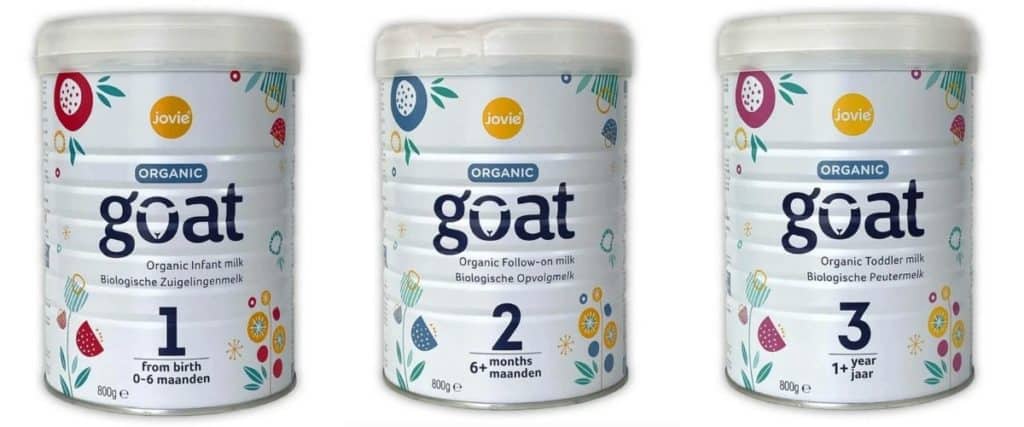
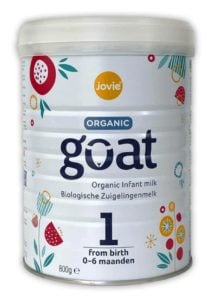
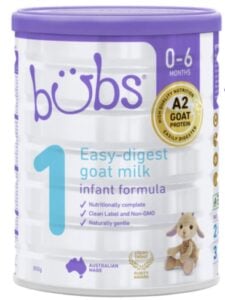
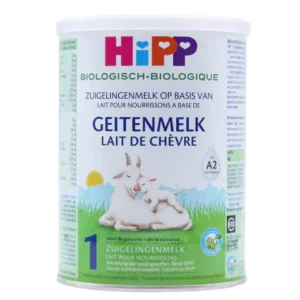
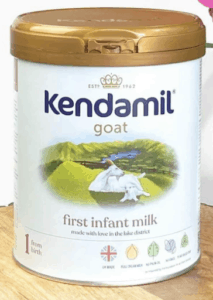
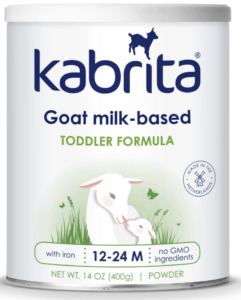
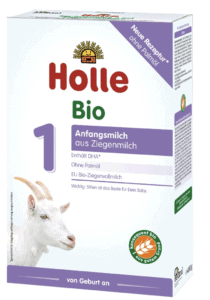
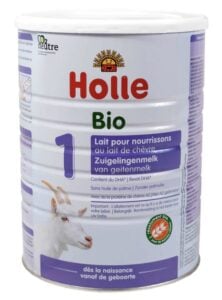
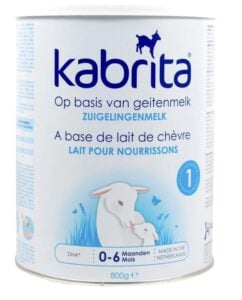
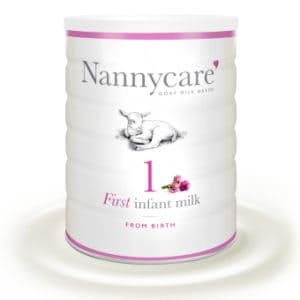
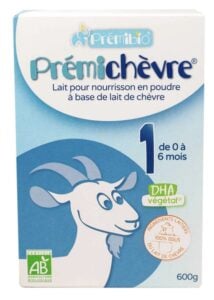
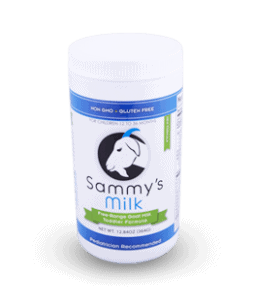


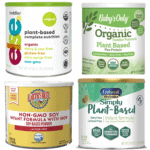
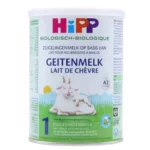





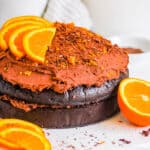
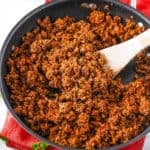
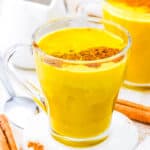
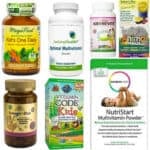
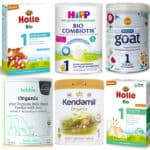



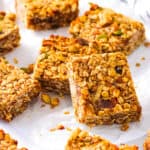




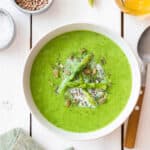
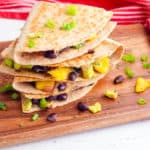



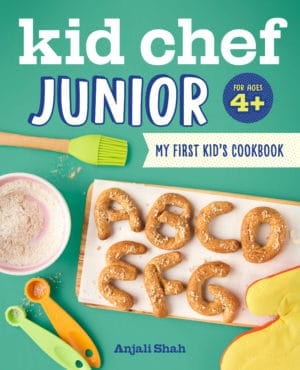


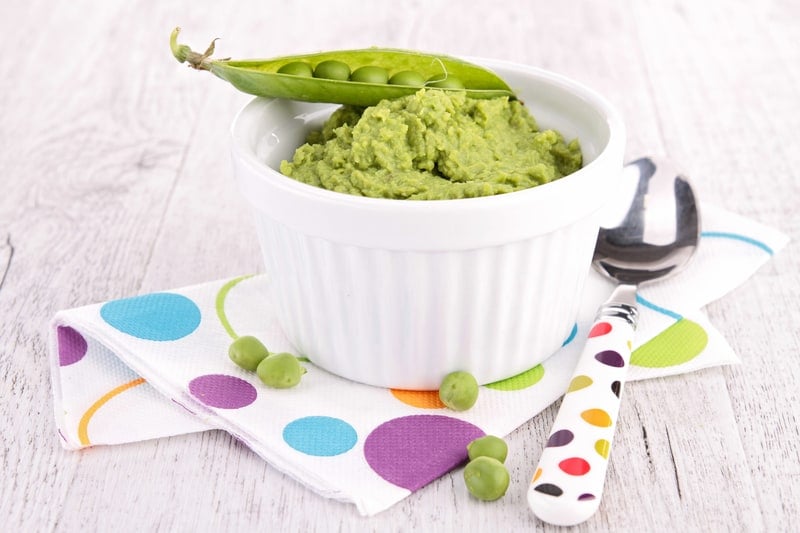



Thank you for this info. I keep going back and forth between Nannycare and kabrita. I thought soybean and palm oil isn’t good to have in formula and kabrita has that? Nanycare doesn’t so why is nannycare not up there? Just curious.
And my little one is only 2 months old. Will I be able to use this formula when she’s so young?
Hi Suzy! The palm oil in Kabrita is actually not the problematic palm oil that is in most formulas. You can read more about the palmitic oil in Kabrita here. Kabrita is also non-GMO, while NannyCare is not. Kabrita does have soy oil — but it’s basically a trade off between having soy oil but having no other synthetic ingredients + being non GMO, and no soy oil but a couple of synthetic ingredients and no non-GMO or organic certifications. Kabrita also seems to be gentler on babies tummies since it has a whey:casein ratio closer to breastmilk. It is marketed as a toddler formula but meets the nutritional requirements for infants, so as long as your pediatrician is ok with it, you should be able to give it to your baby. I would just check with your peds first. Hope that helps!
What are your thoughts on formula allergy causing eczema? Cow’s milk protein. My baby is 5 months old and we have done everything we possibly can re trying to get rid of possible culprit except change his formula (similac lactose sensitive)
Hi Nina! Some babies can’t even tolerate “sensitive” formulas because their milk protein allergy is that severe/sensitive. I’d recommend trying two things: 1) try a hypoallergenic formula and 2) Use these natural remedies for eczema along with the formula change! Hope that helps and hope your baby gets some relief soon!
Hi Anjali! Similar to what someone else asked before, do I have to worry about Kabrita USA containing soybean oil and it causing inflammation on my toddler?
Also, any recommendations on how much to feed toddler (She’s a pretty good eater most of the time)…I’m in the process of weaning her off so wanted to offer her formula to help with the process? Thank you so much for your help.
Hi Marielle! While soybean oil isn’t ideal, the alternative is Holle Goat which has maltodextrin (which also causes inflammation and is high-glycemic), and has a whey-casein ratio that doesn’t mimic breastmilk so it can constipate some toddlers. If you’re going with Goat Milk formula, no formula is going to be perfect so I’d say KabritaUSA is about as good as it’s going to get! As for how much to feed her, I would really ask your pediatrician about that because all toddlers are different — some will have 2-3 8oz bottles of either whole milk or formula a day, some will have much less and will eat more yogurt, cheese etc. So I would ask your pediatrician what they recommend in terms of amount of formula! You can also ask them if your toddler is ready to transition to organic whole milk instead of formula as that can be an option too!
I’ve noticed that in the comments you’ve explained several times that even though Kabrita is marketed for toddlers it can be used for infants. But also in a reply you made to someone you listed their disclaimer that Says Kabrita shouldn’t be used as a main source of nutrition, but rather for weaning and supplementing. I do plan to use it to supplement as I’m pregnant and I think my supply is dropping for my almost 6mo. My question is, if I completely dry up is this not a formula that I can use alone and full time for my baby?
Hi Kelsey! Kabrita has that disclaimer because they want to encourage breastfeeding for the first year of life. But nutritionally, it should be fine to use full time as long as your pediatrician is ok with it! Hope that helps!
Hi Anjali- this is great info! Thank you! My baby has had poop problems 🙂 since birth. She went once a week until about six months. Now- she goes every other day a little bit but it’s very hard. We tried Hipp Dutch and Hipp UK and Hipp HA but no real change. Would you recommend Kabrita for her?
Hi Kristen! I’m so glad this post was helpful for you! Regarding your baby — if she’s over 6 months old and eating solids, I’d actually recommend adding in a serving of these baby prunes into her diet every day, along with a good amount of water (some at every meal). That might actually solve her constipation issues! If she didn’t really see a change between HiPP Dutch, UK and HA she may not see much of a change with only switching to Kabrita – without other dietary changes – but it’s worth a shot! If your pediatrician is ok with you switching to Kabrita, you can go ahead and do that but I’d still add in the baby prunes + water on a daily basis. Hope that helps, let me know if you have any other questions!
I just have a question. You said to not confuse Kabrita USA with Kabrita.com but I’m confused lol. What is the difference? And how come Kabrita UAS only sells toddler formula when Kabrita makes different stages?
Hi Danielle! Kabrita.com is the European version of Kabrita which has stages but the ingredients are worse – they add glucose syrup solids to their formula and other synthetic ingredients. KabritaUSA is the US version of Kabrita, which has much cleaner ingredients and no glucose syrup added! KabritaUSA is technically a toddler formula, but their formula meets the standard nutrition requirements for infant formula. So as long as your pediatrician is ok with you using KabritaUSA for your baby it’s a perfectly good option!
Hi Anjali! I used the Mt Capra recipe with my first two as they both we end themselves at 4-5 months. I love the Mt Capra goat milk/recipe however when traveling it can be difficult as you have to take it pre-made, keep it cold, then heat it enough for the coconut oil the liquify.
I just had our 3rd & in the event the he weens early too, would you say the Capra & Kabrita compare in quality?
Hi! Thanks so much for reaching out! The Mt Capra recipe is great but I totally agree with you about the traveling component — taking it on the go is definitely not easy. I’d say Kabrita is probably the most comparable to Mt Capra since it’s the cleanest goat milk formula out there! The ingredients are still different than Mt Capra but nutritionally it is complete for infants. I hope that helps, let me know if you have any other questions!
Are you not concerned that the soybean oil, palm kernel oil, and sunflower oil are inflammatory and not good for the baby?
Hi Bill! The Mt Capra recipe does not include palm kernel oil or soybean oil. They do include sunflower oil, but it is High Oleic Sunflower oil which delivers monounsaturated fats and vitamin E, but can be replaced with Extra Virgin Olive Oil as well.
Thank you so much for your website. It was so wonderful to read all your questions and answers. I feel so much better now that I read them.
Thank you so much Marjorie! I’m so glad it was helpful for you!
Hi there! I have a 5 mo old I’d like to start on Kabrita. Will she get enough folic acid? If not do you have a suggestion to supplement with?
Hi Britney! Kabrita has the same amount of folic acid as all the standard US formulas (16mcg for 100 calories). So you should be fine! I would double check with your pediatrician to make sure they don’t have any concerns as well — but the amount of folic acid looks identical to me!
Hi Brittany, how are you using Kabrita if it’s only intended for 12-24month olds?
Curious mom with 5 month old baby girl.
Hi Stefanie! Kabrita meets the nutritional requirements for infant formula (see their chart here). So as long as your pediatrician gives you the ok, you can give Kabrita to your infant!
Hello, I have a grandchild that is 3 months old and is having many issues with all formulas that we have tried. Does Kabrita make a 0-6 month formula? I see on my research that it is found in Europe. Thank you
Hi Felix! The Kabrita infant formula (from Europe) actually does not have good ingredients and I wouldn’t recommend it. Kabrita USA, even though it’s marketed for toddlers, meets the nutritional requirements for an infant formula. If your pediatrician is comfortable with it, you can certainly use it for a baby younger than 12 months. Hope that helps!
The Kabrita USA offers formula for 12 months+ I did not see another option. Do you know if they carry formula for a 4 month old ?
Hi Myranda! Kabrita USA is marketed as a toddler formula but it meets the FDA nutritional requirements for infant formula. So I would just double check with your pediatrician that they are comfortable with you using it, and then you should be fine giving it to your baby!
Hello again!
I recently changed to Kabrita which my baby has done well with, she’s 3 months today! My pediatrician wasn’t too happy with it though, more so because he had never heard of Kabrita & said that if she didn’t have an intolerance to cow milk there was no reason why I should have her on goat. That she needed the cow formula to benefit her brain and so on. (I also live in a city where doctors are not very progressive & are “old school” who just want to prescribe similac & enfamil, which I don’t want to give my child. Any suggestions!? Thanks so much
Hi Denay! I think if your baby is doing well on Kabrita there is no need to change formulas! I agree with your doctor that you don’t have to do goat’s milk formula if your baby does well on cow’s milk, but Kabrita is nutritionally complete for infants according to their website. I think if you really want to get your pediatrician on the same page as you, I’d print out the nutritional label for Kabrita and the nutritional label for Similac and show it to them (they’ll see that the nutrition labels are quite similar, even though the actual ingredients in Kabrita are totally different and far superior to Similac!) Hope that helps!
What are your thoughts on Earth Fare’s goat milk formula?
Hi Valeri! I couldn’t find any info on Earth Fare – are you sure that’s the brand of the formula you’re looking for? If so, feel free to email me a photo of the label/ingredients/nutrition (pickyeats@gmail.com) and I can take a look!
Do you know why Kabrita USA is labeled as a toddler formula, but meets FDA nutrition guidelines for infant formula? Why not just label it as infant formula?
Thanks for you help!
Hi Michelle! Basically, there are additional FDA regulations for infant formulas that Kabrita USA hasn’t gone through yet (I believe they are doing this in 2019) and that’s why for now, it has to be labeled as a toddler formula even though it meets the nutritional guidelines for infant formulas. I know lots of moms who have used Kabrita for their infants and their babies have done well on it, so if your pediatrician is comfortable with you using Kabrita for your baby I don’t see any reason why it should be an issue! Hope that helps!
I read in another blog that Kabrita has too much protein for infants less than 12 months. Do you have an opinion on this?
Hi Kelly! Kabrita has 2.7g protein per 100 calories, vs 2.1g protein (on average) for most infant baby formulas. Babies need around 0.69 grams of protein per pound of body weight per day from 0 to 6 months and 0.55 grams per pound of body weight from 7 to 12 months. So depending on your baby’s weight and how much formula they drink daily, Kabrita may have just enough or too much protein for your baby! I would ask your pediatrician if the difference between 2.7g and 2.1g per 100 calories is something they feel comfortable with depending on the needs of your little one. Hope that helps!
Sammy’s is the only one that doesn’t have folic acid. I want to avoid that because baby has mthfr. But the recall makes me nervous. What do you think of my capra recipe and making it myself?
Hi Crystal! That makes sense – that’s why Sammy’s is ranked lower on my list as well! Regarding the capra recipe, as far as I know it looks good and the moms I know who have tried it have had success with it. If you’re thinking of going down that path I’d talk to your pediatrician to make sure they’re comfortable with it too!
Which vitamin powder will you use with Mt Capra for folate? The one they provide has folic acid if I’m correct? My baby has mother too, and I’m in the same dilemma.
Hi Brooke! Did you mean MTHFR? (not mother?) If so, I’m actually not aware of an infant vitamin that has methylated Bs — all of the vitamins for kids with methylated Bs are for toddlers and older. Your pediatrician might be able to give you a prescription for methylated B vitamins that are suitable for infants. And if you do find an infant vitamin with methylated Bs let me know and I’ll add it to my vitamins guide! Thanks!
Hi! Any thoughts on Mt. Capra’s recipe and goat milk products?
Hi Courtney! I have never used Mt. Capra’s recipe personally, but I know other moms who have and have had success with it. If you are thinking of trying their recipe I’d just check with your pediatrician to make sure they’re comfortable with you following that recipe for homemade formula for your little one. Mt. Capra’s goat milk products have super clean ingredients and it looks like they are non-GMO and organic (the goats either graze on grass or are fed organic hay/feed). Hope that helps!
Hello!
Thanks for the great info! I see that Kabrita seems to only have a 12-24 month formula. is that for labeling purposes, but its actually ok for infants? thanks!
Hi Heather! So yes it is for labeling purposes, and I know moms who use Kabrita for their infants with no issues. That said, you should definitely check with your pediatrician before using this formula for your little one just to make sure they are on board with it! Thanks!
Did you know that organic start has Kabrita goats milk for infants, but the only downside is that they are charging $69 a can. Is this the same company that makes Kabrita toddlers formula and is it as good?
Hi Rebekah! Actually the one on Organic Start isn’t the same one that I recommend. The one on Organic Start is Kabrita from Europe, and the one I recommend is actually Kabrita USA. Kabrita is the one brand where the US version is way healthier than the UK version! The UK version has glucose syrup solids added among other things, but the US version has really clean ingredients and it’s way cheaper! So buy the US version, and don’t buy the one on Organic Start. Hope that helps, let me know if you have any other questions!
But this one is toddler formula for 12-24 month.
My baby is 5-1/2 months old.
How is it ok to use the toddler formula? Just need to know before I try one. I just got the Holle brand stage 1. It does not show taurine in the ingredients. It also has decent mg of whey protein. Help
Hi Shari! Regarding Kabrita – you can use it for infants. This is what Kabrita says about the toddler formula designation: “Kabrita Goat Milk Toddler Formula meets the FDA nutrient requirements for infant formula, but we do not recommend it as the only source of nutrition for either infants or toddlers. Our formula is naturally easy to digest and designed to maintain the natural comfort of little ones during feeding transitions, such as weaning and supplementing. We encourage you to speak with a healthcare provider to discuss your child’s nutritional requirements and the available feeding options.” I know lots of moms who have given it to their infants with no issues, but you should just check with your pediatrician before starting any new formula just to make sure they are on board. Holle Stage 1 does not have taurine – you are right. In my post I didn’t say it had taurine, I ranked it third because it has maltodextrin, palm oil, and while it does have whey, the whey-to-casein ratio is not ideal for infants and can be constipating for some babies. I hope that helps, let me know if you have any other questions!
Do people use the goat milk formula even if their baby doesn’t have a cow’s milk sensitivity? I am sensitive to cow’s milk and so is my older son. I’m looking for something to supplement with as I can’t keep up my milk supply with working. I just can’t pump the same amount of ounces that he’s eating at daycare. Your post mentioned this is the closest thing to breastmilk so it caught my attention.
Hi Heather! Yes you can use a goat milk formula even if your baby doesn’t have a cow’s milk sensitivity! Goat milk formula is a replacement for cow’s milk formula – it has all of the same nutrients you’d get but just uses goat milk as a base instead of cow’s milk. So I think as long as your pediatrician is ok with it, you can use this formula for your little one!
Hello, does Kabrita meet the nutritional requirements for a 4 month old? It is advertised as a toddler formula.
Hi Jennifer! I do know parents of infants who use Kabrita and have had no issues with it. Kabrita is similar to Baby’s Only in that it’s marketed as a toddler formula but can be used for infants. That said, I would definitely ask your pediatrician before starting your baby on it – just to make sure they are comfortable with it as well! Hope that helps, let me know if you have any other questions!